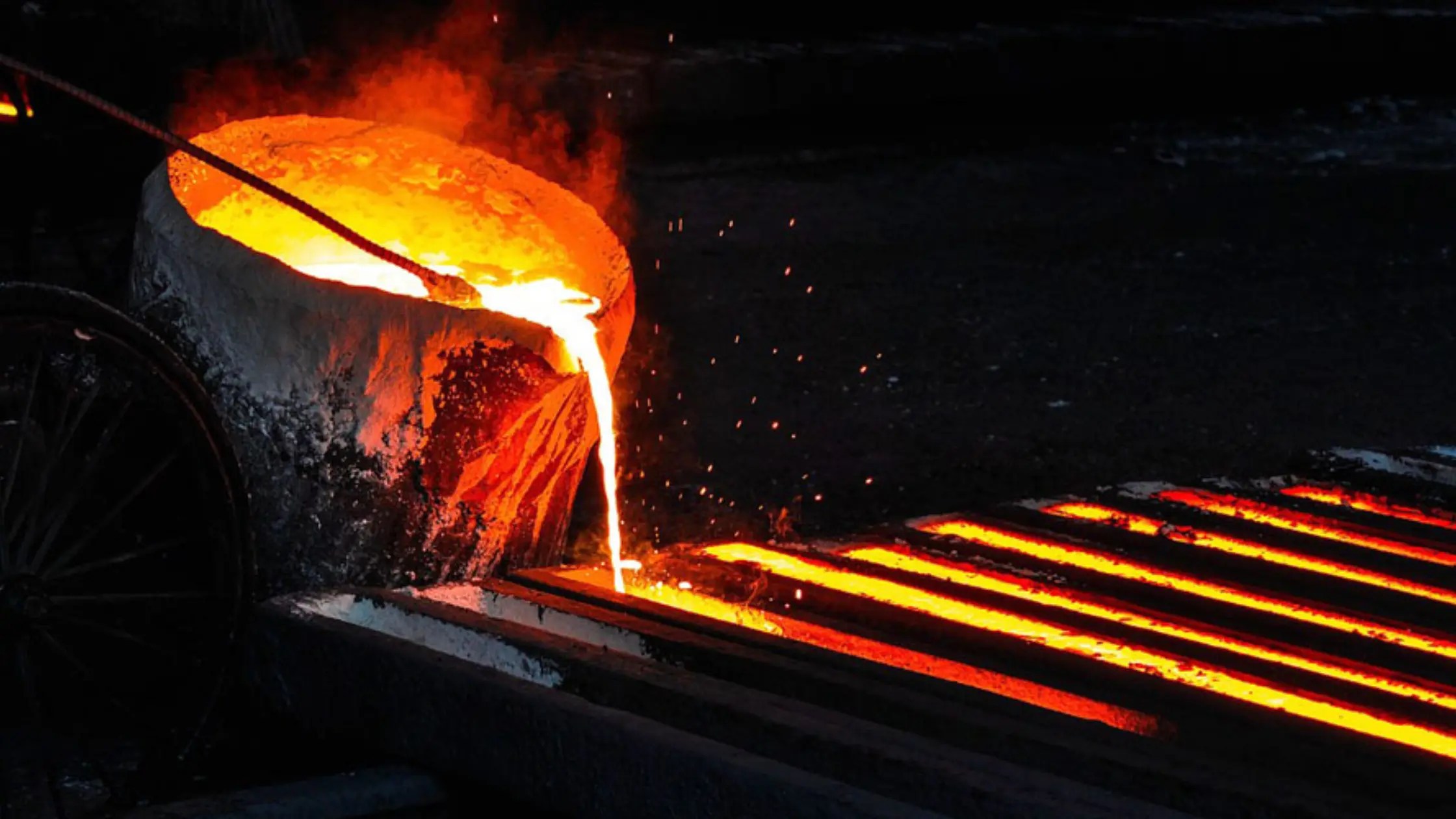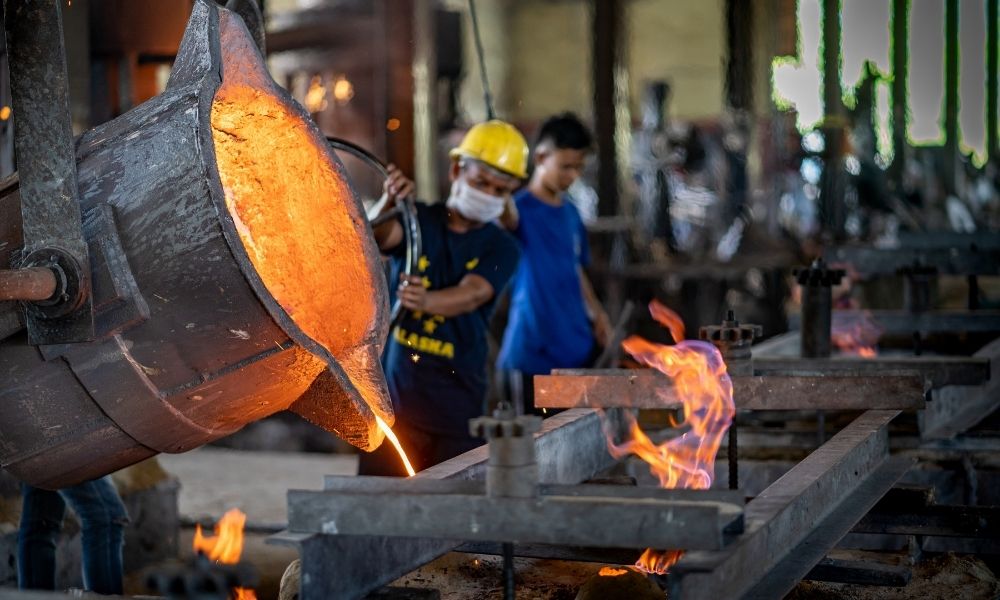10 things you didn’t know about the modern Aluminum Foundry world
Wiki Article
A Deep Study Metal Foundries: Trick Services and Their Influence On Production
Steel foundries are essential to modern manufacturing, providing vital solutions that shape the manufacturing landscape. They specialize in various casting procedures, ensuring accuracy and quality in steel parts. The advancement of modern technology and lasting practices has further influenced their procedures. As markets progressively depend on these factories, understanding their crucial solutions and the ramifications for production effectiveness becomes vital. What obstacles and developments lie in advance for this critical market?Comprehending Steel Casting Procedures
Metal spreading procedures transform liquid metal into solid items via different methods, each customized to particular applications and products. Among one of the most typical approaches are sand casting, financial investment spreading, and die casting, each offering unique advantages. Sand casting uses a mold and mildew made from sand, allowing the production of big parts at a reasonably reduced price. Financial investment spreading, on the other hand, includes developing a wax pattern that is covered in ceramic, producing complex and highly comprehensive shapes. Die casting uses high stress to require liquified metal right into a mold and mildew, which is perfect for mass manufacturing of tiny, precise parts. These processes enable a variety of steels to be made use of, consisting of light weight aluminum, steel, and bronze, suiting varied industrial requirements. The choice of an appropriate casting strategy depends on elements such as needed resistances, manufacturing volume, and product buildings, affecting the total performance and effectiveness of the end items.The Significance of Precision Casting
Precision casting plays a necessary duty in creating elements that demand high accuracy and detailed information. This approach, frequently referred to as investment casting, permits tight tolerances and complex geometries, making it vital in markets such as aerospace, automobile, and medical devices. By making use of wax patterns that are coated with a ceramic shell, precision spreading enables the creation of get rid of smooth surfaces and very little finishing needs.
Alloy Advancement and Product Choice
In the domain name of metal foundries, alloy development and material option are important elements influencing the performance and durability of cast elements. The option of alloy straight affects mechanical homes, such as ductility, deterioration, and strength resistance, important for meeting certain application requirements. Factories often participate in extensive research and testing to enhance alloy make-ups, tailoring them to the distinct needs of numerous markets, including automobile, aerospace, and building.Material selection also involves evaluating aspects like manufacturability, availability, and expense, guaranteeing that the picked alloy lines up with production capabilities and budget plan restraints. Advanced simulation tools and logical approaches are utilized to forecast the actions of different alloys under varying problems, giving beneficial insights for engineers. Inevitably, effective alloy development and material option make it possible for foundries to generate premium elements that enhance functional efficiency and reliability in their intended applications.
Cutting-edge Molding Strategies
Transforming the production procedure, innovative molding methods play an essential role in boosting the effectiveness and top quality of actors parts in steel foundries. Techniques such as 3D printing and vacuum molding have emerged as game changers, permitting intricate styles and decreased lead times. These methods allow factories to create mold and mildews with complex geometries that typical techniques frequently struggle to attain.Additionally, using sophisticated materials for mold and mildews, such as composite materials, boosts resilience and decreases wear, causing longer production runs. Quick prototyping more permits quick versions, assisting in much faster development cycles and making it possible for manufacturers to react even more promptly to market needs.
Automation in molding processes improves procedures, decreasing human error and boosting throughput. By integrating these ingenious approaches, steel shops can optimize their production abilities, ultimately bring about greater top quality castings and improved overall performance in the competitive production landscape.
Quality Assurance in Metal Foundries
Quality control in steel factories is essential for making certain the honesty and performance of actors products. It encompasses different assessment techniques and standards, in addition to defect detection methods to identify potential concerns early in the production procedure. Durable high quality assurance procedures are important for keeping uniformity and conference market demands.Examination Techniques and Specifications
Ensuring the honesty of metal spreadings requires rigorous inspection strategies and adherence to established standards. Steel foundries carry out various assessment approaches to review the high quality of cast items, consisting of aesthetic inspections, dimensional checks, and non-destructive screening (NDT) These strategies assist to recognize prospective problems early in the manufacturing process. Specifications such as ASTM and ISO provide standards for appropriate top quality levels and screening treatments, ensuring that foundries keep constant top quality across their assembly line. Conformity with these requirements not only enhances item dependability however likewise promotes trust fund amongst customers. By focusing on assessment strategies, steel shops can mitigate dangers connected with flaws and assurance that their castings fulfill consumer requirements and industry demands.Issue Discovery Approaches
Efficient flaw detection approaches are essential to preserving high standards in steel factories. These approaches encompass a range of techniques targeted at identifying blemishes in castings before they are processed additionally. Typical methods include aesthetic examination, which counts on the skilled eye of assessors to find surface imperfections, and non-destructive screening (NDT) methods such as ultrasonic screening and radiography, which reveal internal problems without damaging the product. Furthermore, automated systems employing maker learning and expert system are increasingly utilized to examine data and identify abnormalities. Each approach plays an important role in making certain the honesty of the end product, lessening waste, and boosting general manufacturing effectiveness. By executing robust defect discovery procedures, shops can promote their reputation for quality.High Quality Guarantee Processes
In metal foundries, a detailed quality control procedure is necessary for producing trustworthy and high-performing spreadings. This procedure includes different phases, consisting of basic material assessment, in-process tracking, and final product assessment. By implementing standardized treatments, shops can methodically determine and remedy defects prior to they escalate right into costly concerns. Advanced methods, such as non-destructive screening and metallurgical evaluation, are used to examine the integrity of spreadings. Moreover, documentation and traceability are vital components, ensuring that each step of production meets strict high quality requirements. Training employees in quality control methods you can check here even more improves the effectiveness of these processes. Eventually, a durable quality assurance structure not just boosts operational efficiency however also enhances consumer depend on and contentment in the foundry's result.The Role of Technology in Factory Operations
Technology transforms factory procedures by boosting effectiveness, accuracy, and safety and security. Automation plays a vital function, simplifying processes such as mold making and steel putting, consequently reducing labor expenses and decreasing human error. Advanced computer-aided layout (CAD) software makes it possible for precise modeling of parts, helping with quicker changes and iterations during production.The combination of robotics in jobs like material handling and completing procedures increases efficiency and warranties consistent quality. Real-time surveillance systems and information analytics offer valuable understandings into operational efficiency, permitting prompt interventions and upkeep, which inevitably prolongs devices life-span

The adoption of 3D printing innovation further enables rapid prototyping and personalized remedies, significantly decreasing preparations. In addition, sophisticated materials innovation enhances the residential or commercial properties of alloys, boosting spreading efficiency. To summarize, technical developments are crucial in optimizing foundry procedures, enabling manufacturers to fulfill the enhancing needs for quality and efficiency in the competitive steel industry.
Ecological Considerations in Steel Casting
Environmental considerations in steel spreading play a significant function in shaping sector methods. Efficient waste administration, advanced exhaust control innovations, and the usage of sustainable products are essential for minimizing the environmental footprint of foundries. Resolving these elements is important for promoting a more lasting future in steel manufacturing.
Waste Management Practices
Effective waste management methods are necessary in the metal spreading market to mitigate environmental influences. Aluminum Foundry. Shops produce different sorts of waste, consisting of steel chemical, sand, and scrap deposits. Implementing reusing programs allows for the repurposing of steel scrap, decreasing the need for virgin products and reducing garbage dump payments. In addition, foundries often make use of sand improvement processes, which recycle and recover sand several times, thereby decreasing waste generation. Correct disposal approaches for unsafe materials, such as binding representatives and solvents, are vital to avoid dirt and water contamination. Employee training on waste segregation and decrease methods can enhance overall efficiency and sustainability. Through these methods, steel factories can significantly decrease their environmental impact while preserving production performanceExhaust Control Technologies
As the metal spreading market advances, the implementation of sophisticated exhaust control innovations becomes increasingly crucial for minimizing unsafe toxins launched during manufacturing processes. These technologies encompass various methods, including electrostatic precipitators, scrubbers, and catalytic converters, which effectively capture and counteract discharges before they enter the atmosphere. By integrating such systems, shops can substantially lower particle issue, volatile organic compounds, and various other unsafe emissions. Furthermore, conformity with rigorous environmental regulations not only alleviates environmental influence but likewise enhances the sector's reputation and functional effectiveness. The fostering of these technologies reflects a dedication to sustainable practices, making certain official statement that steel casting operations can satisfy the expanding need while prioritizing environmental health and wellness.Sustainable Materials Use
Lasting materials usage in steel casting plays a necessary role in decreasing the industry's environmental footprint. Foundries are significantly embracing recycled steels, which significantly decrease the need for virgin sources and reduced energy intake during the production process. In addition, using environment-friendly binders and ingredients enhances the sustainability of casting operations by decreasing unsafe discharges and waste. Technologies in material scientific research also allow for the growth of eco-friendly alternatives that do not compromise product quality. Additionally, foundries are executing life-cycle assessments to evaluate the environmental impact of materials throughout their life expectancy, advertising more liable sourcing and use. In general, these practices add to a much more sustainable and environmentally mindful metal casting sector, aligning with global efforts to decrease carbon impacts.Often Asked Concerns
What Are the Key Kind of Steel Used in Factories?
Factories mostly use steels such as iron, magnesium, aluminum, and copper. These materials are chosen for their distinct properties, which influence the casting process and the performance attributes of the end products manufactured.Just How Do Factories Make Sure Employee Safety And Security Throughout Operations?
Foundries guarantee employee safety and security through extensive training, appropriate devices, ventilation systems, and adherence to safety and security regulations. Regular assessments, personal safety gear, and emergency procedures even more boost a risk-free working atmosphere for staff members taken part in steel production.What Is the Common Lead Time for Casting Manufacturing?
The check my site common lead time for spreading manufacturing differs, generally varying from a few weeks to a number of months. Variables influencing this timeline consist of intricacy of the design, material accessibility, and the foundry's manufacturing ability and organizing.Exactly How Do Foundries Manage Waste and Recycling Processes?
Foundries take care of waste and recycling by executing procedures such as steel improvement, sand recycling, and proper disposal of hazardous products, thus lessening environmental effect and promoting sustainability in their operations while adhering to governing requirements.What Industries The Majority Of Generally Utilize Metal Foundry Providers?
Steel shop services are primarily made use of in sectors such as automotive, building and construction, machinery, and aerospace production. These sectors count on factories for generating actors steel elements essential for various applications and product advancement.Steel shops are important to contemporary manufacturing, offering crucial solutions that shape the production landscape. Steel casting procedures transform fluid steel right into strong items via various techniques, each customized to particular applications and products. As modern technology advancements, the relevance of precision casting continues to grow, driving technology and effectiveness in steel shop procedures. Transforming the manufacturing process, cutting-edge molding methods play a critical role in improving the effectiveness and top quality of actors components in steel foundries. In steel factories, a thorough top quality guarantee procedure is vital for generating high-performing and trustworthy spreadings.
Report this wiki page